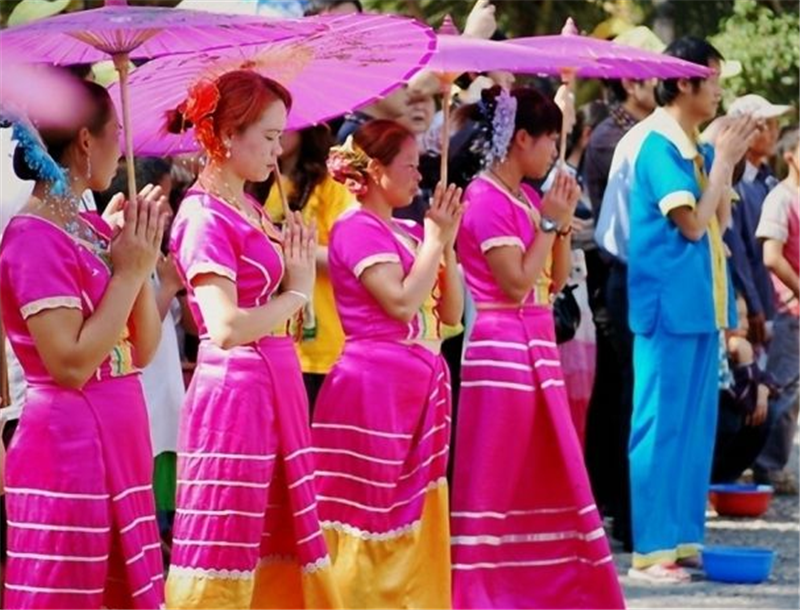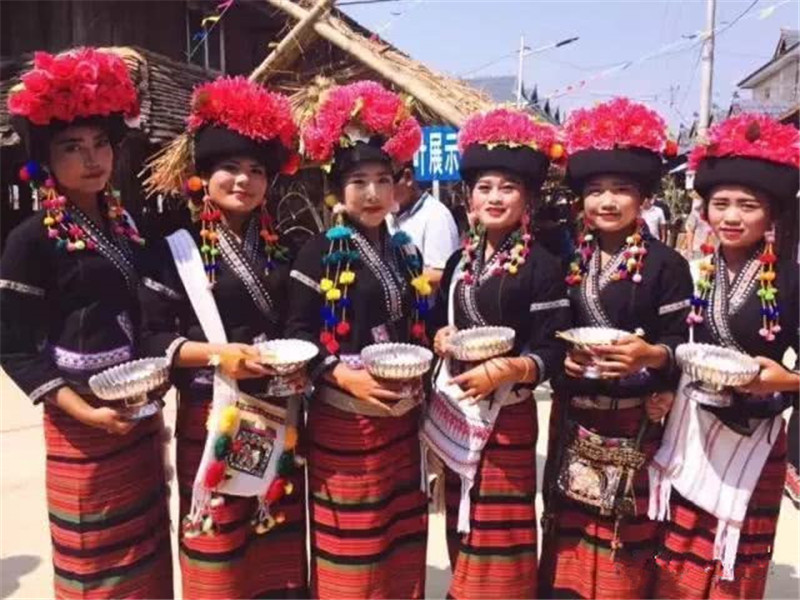Guanmen (Closing Door) Festival of Bulang Ethnic Minority
Chinese Name: 布朗族关门节/考瓦沙
English Name: Guanmen (Closing Door) Festival of Bulang Ethnic Minority
The Guanmen Festival, also known as “Kaowasha,” is a religious holiday observed by some Bulang people who follow Mahayana Buddhism. It is held annually from the 15th day of the ninth month to the twelfth month in the Dai calendar (roughly mid-June to September in the lunar calendar), and is celebrated in the southwestern and southern Bulang settlement areas of Yunnan Province. The Guanmen Festival marks the closing of the doors to love and marriage among the Bulang people. During this festival, young men and women of the Bulang ethnicity are forbidden to engage in romantic relationships or marriages.
On the 15th day of the ninth month according to the Dai calendar, the entire Bulang village attends a Buddhist ceremony at the monastery, listens to Buddhist scriptures, and performs the “drip water” ritual. Elderly men and women over 40 years old stay in the monastery, and the entire village suspends production activities for a day. In the evening, young people drum and dance, creating a festive atmosphere throughout the village.
Early in the morning, every household is busy steaming colorful glutinous rice and preparing pastries. Offerings are made to the Buddha and given to relatives and friends, and feasts are prepared. Three days later, the monastery gates are closed for three months, during which monks chant scriptures day and night, and people refrain from leaving the monastery.
During the three-month period of the Guanmen Festival, the main activity for the people is to listen to Buddhist scriptures at the monastery. The scriptures mainly consist of stories of those who have attained enlightenment, inspiring the listeners to aspire to achieve Buddhahood. From the Guanmen Festival to the opening ceremony three months later, the Bulang people do not hold weddings, build new houses, or travel far from home. They concentrate on production activities and regularly visit the monastery to worship and make offerings. The devout elders wear white clothes and white headscarves, observing strict dietary rules, and some stay in the monastery. Every seven days, there is a Buddhist worship ceremony where offerings of food and candles are made to the Buddha and ancestors, while monks recite scriptures and explain Buddhist teachings, rules, and stories. A significant event during this period is the “redemption of sutras,” where Buddhist scriptures are offered.
When the three-month period of the Guanmen Festival is completed on the 15th day of the twelfth month according to the Dai calendar, the Opening Door Festival is celebrated. People bring paper flowers, candles, fruit trees, food, and coins to the monastery for a grand Buddhist ceremony. Similar to the Guanmen Festival, there are offerings of alms, chanting of scriptures, and communal meals. At night, fireworks are set off, sky lanterns are released, dances are performed, and lanterns are paraded around the village to celebrate the end of the closed-door period and the beginning of an open-door period. After this night, the village returns to its usual romantic and festive life. Monks are allowed to leave the monastery, people can travel far from home, farmers can build new houses, and young men and women can date and marry.
During the Guanmen Festival, usually around the 14th day of the ninth month according to the Dai calendar (July 15th in the Gregorian calendar), Bulang believers prepare to go to the monastery to burn incense and prepare Buddhist offerings. Men are busy making gold and silver baskets and other offerings, while women start making dumplings and steamed meat for the following morning’s trip to the monastery. On this day, all Bulang villages in Xishuangbanna begin the drip water ritual. People start preparing the items they need to bring to the monastery early in the morning, and believers rush to the monastery to offer their offerings, hoping to be the first to receive merit. Inside the monastery, people wash their ears and listen respectfully to the Buddha’s recitation of the “Merit Sutra” and “Amitabha Sutra,” praying for peace and safety for themselves and their livestock.
They also call upon the spirits of deceased relatives to pay attention to the living and bless them, accepting the offerings made to them by their loved ones. After listening to the Buddha’s recitation, people return to their homes to apologize and bless their elders (Su Ma), such as grandparents and parents, and start a sincere three-month period of guarding the summer. During this period, people are busy with the things they need to do around the three-month period of guarding the summer.













